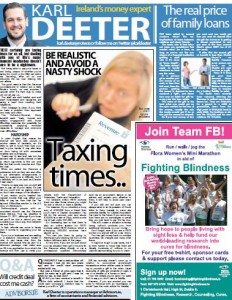 [The actual copy is available here, or by clicking on the picture of the newspaper page] The headline this week is from the famous quote that ‘the only sure things in life are death and taxes’. We have looked at death in the past from the perspective of Life Assurance, this week it’s about taxes – and more importantly, what to do if you can’t pay them or if you are not sure about your taxes.
[The actual copy is available here, or by clicking on the picture of the newspaper page] The headline this week is from the famous quote that ‘the only sure things in life are death and taxes’. We have looked at death in the past from the perspective of Life Assurance, this week it’s about taxes – and more importantly, what to do if you can’t pay them or if you are not sure about your taxes.
The good news is that the Revenue Commissioners in Ireland are a fairly effective bunch and the people there are well briefed and effective (this is no surprise as their duty is to make sure everybody pays up!).
Revenue are well aware of the state of the economy, and that businesses and taxpayers are having a hard time meeting their obligations, and their message is clear, if you think you have, or may have a problem then approach them early and often.
Their Collector-General, Gerry Harrahill has said in the past that “Early, honest and realistic engagement with those difficulties maximise the possibilities for successfully applying remedial measures to manage and overcome those difficulties.”
What does that mean in plain English? It means that Revenue will work with honest cases where the person is finding it hard to pay, by engaging rather than burying your head you will also avoid senseless penalties and surcharges.
A surcharge is another word for a penalty, and they vary in size and rate. The standard rate of penalty interest on late payments for tax returns are 5% after the first month of being late and 10% after that.
We called the Revenue and were told that they can and often do put alternative arrangements in place for customers in difficulty, but that they do not want to be used as a lender of last resort.
So the underlying message is that you still have to pay all of your taxes, there are no ‘easy ways out’. And don’t forget, unlike the majority of debts, Revenue will never go away if you don’t pay them.
If you reckon that you are headed into financial trouble that may affect your ability to pay tax then call one of the numbers in the table provided and speak to somebody straight away.
For self employed people who have an accountant, they likely use the ROS (Revenue Online Service) for them and your tax deadline is not until 31st October 2011, although if you are due a refund and you already know this you can do your return any time between now and then in order to get that refund.
In fact, in the area of refunds, you can sometimes use them to help organise your tax affairs.
If a business is awaiting a statutory redundancy rebate in order to pay taxes due then the Revenue will accept this as part of a deferment package. You just need to fill in an application form and then Revenue will verify things with the Department of Enterprise, Trade and Innovation.
For PAYE workers (and there are just over 1,000,000 of them in Ireland) there are also times where you might be due a refund or have a liability.
For instance, if you inherited money from an Aunt (as it’s hypothetical we’ll be generous) say €100,000 then you’ll have a Capital Acquisition Tax (CAT) bill for the amount over and above €16,604 at a rate of 25%, which works out at just under €21,000.
An interesting fact is that there is also a ROS system for PAYE workers called ‘PAYE Anytime’, and a whopping 580,000 (well over the 50% mark) of PAYE workers have signed up to it. If you haven’t you can by going to www.Revenue.ie and its on the bottom left hand side of the page.
At any time, if you are not sure about your tax situation then get in touch with Revenue either directly or via a professional qualified intermediary (Accountant, Lawyer, Tax Advisor) and engage with them, it will help to avoid pain down the line.
If you still are not sure you can always send in an ‘Expression of Doubt’ letter to them (for things like CAT) and in the future if you are wrong then there are no surcharges or penalties, you just have to pay the tax due, that creates a situation whereby being upfront protects you from additional demands on your money.
Don’t forget, even if you are a PAYE worker you should still do a tax return, you can get money back on medical expenses, bin charges and many other items. It might be tough to pay taxes, but it is even harder to know that there are literally hundreds of millions in unclaimed taxes that waiting for our readers to claim!

Post a Comment